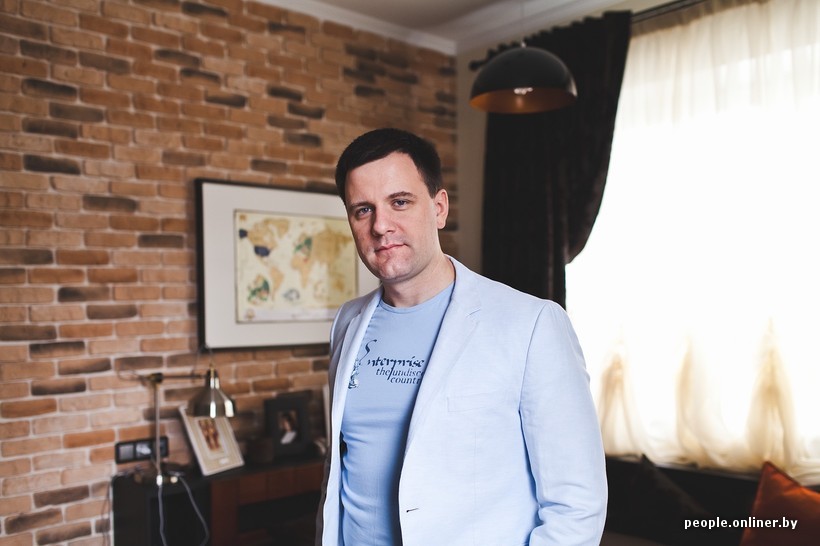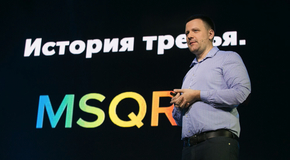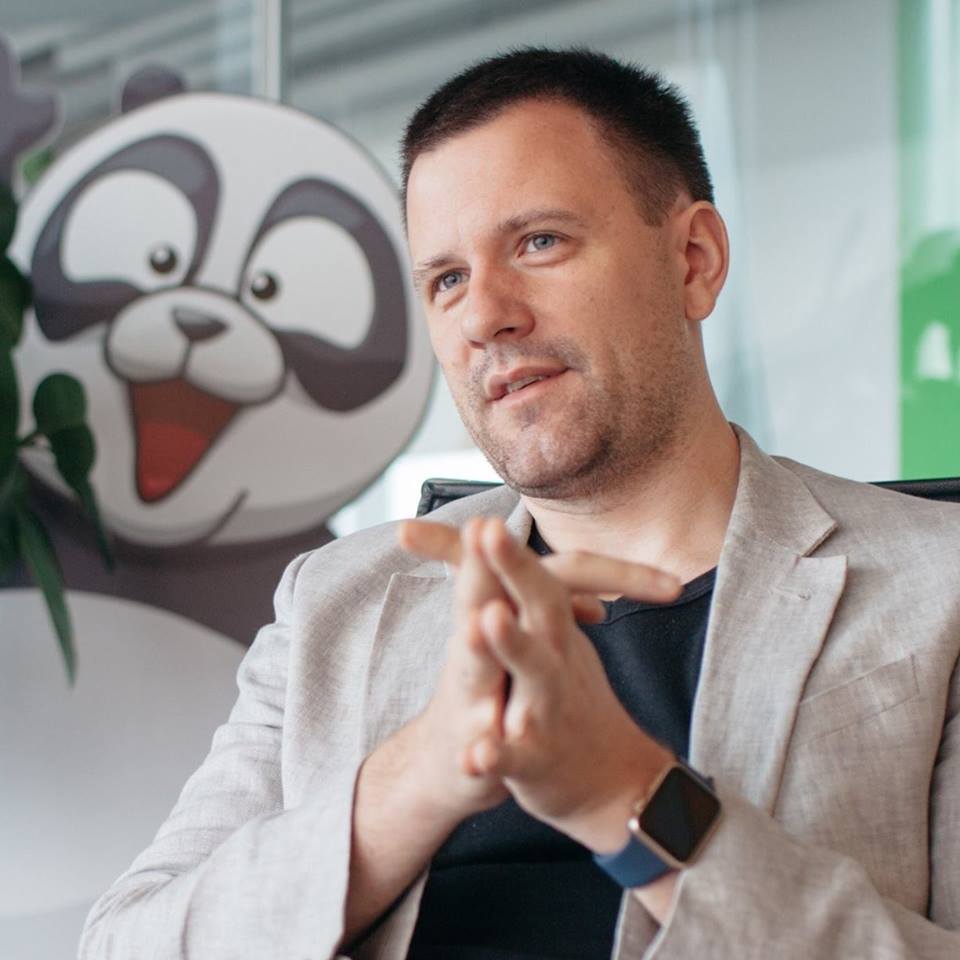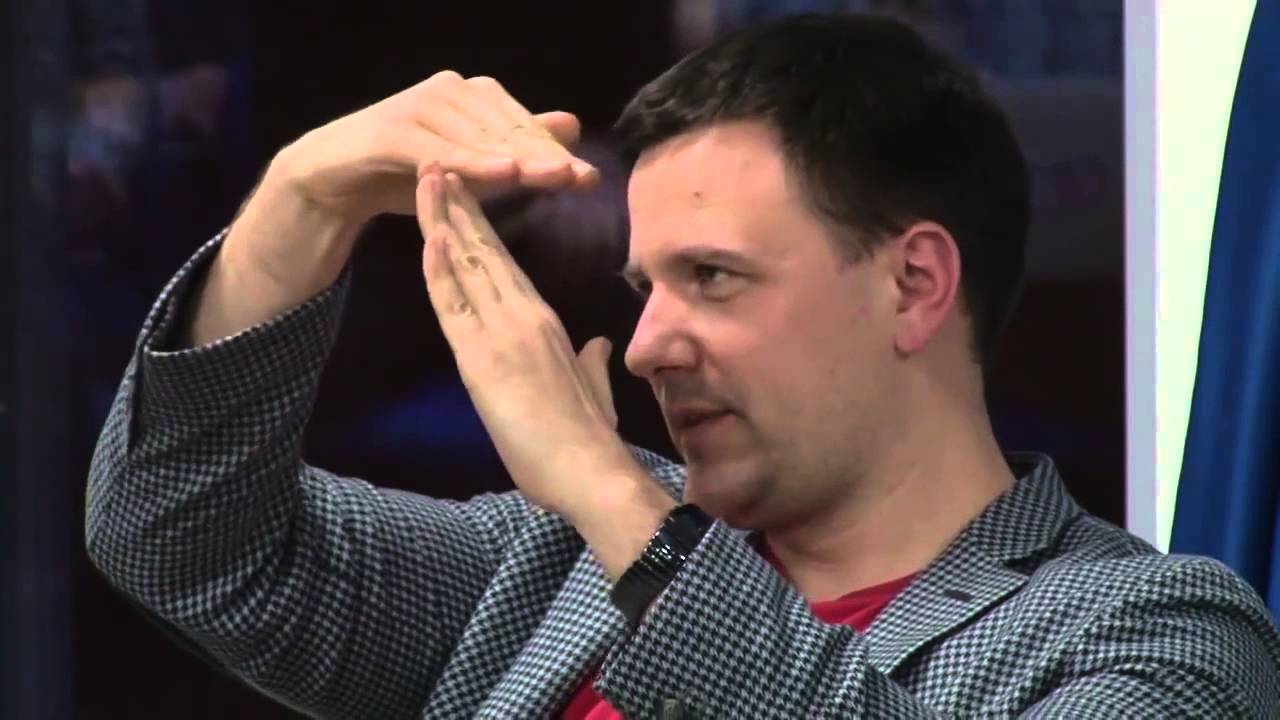Vice-president of new products Mail.ru Group Yuri Gursky - about their own projects: Maps.me, MSQRD and Prisma

Yuri Gursky is a man about whom they write a lot today. A representative of a few Belarusian entrepreneurs, now a vice-president of Mail.ru Group and a person partially responsible for the success of MSQRD.
In one of the past interviews, Yuri said that he considered himself, first of all, a specialist in the field of B2C-mobile solutions, and the previous 15 years he had to put up with the inefficiency of wasting his own time.
')
Yuri took the time to talk with us and answer, if not all, then at least some of the questions.
What is happening now in your life and where will all this lead in the next 2-3 years?
It is now clearly visible what is happening is what I have been waiting for for many years. I was lucky to be at the beginning of the mobile revolution and earn enough quickly. But since then (the year since 2012) everything has been, in principle, rotten. You can always create good products, sitting down on deep technological trends, technological changes. In conditions of stagnation for this you need to make incredible efforts.
But I see that for three months now, a new revolution has begun. And I'm going to concentrate on this revolution. This is a revolution of artificial intelligence. Several trends coincided, and now artificial intelligence is taking off like a rocket. Therefore, in terms of investments, either AI technologies or something that produces “fuel” for artificial intelligence and is able to generate a large amount of data are interesting. I am sure that within a year or two the data will become more important than money, more expensive than money and will be actively bought up.
Do you already have any specific products, projects with which you work, in which you take part?
I now have several projects in the state of signing contracts.
Later, Yuri announced that he was a mentor in the Prisma project, developed by Alexey Moiseenko:
Prisma is the first project that I supported because of the idea of using AI in a mass product. Growth is fantastic now - five times faster than MSQRD. A million users in 4 days came without any advertising and PR.
There is a question related to Mail.ru Group. You, if I understand everything correctly, for a long time remained a person who works in small and dynamically developing startups. Until recently, it was just a small or medium computer or internet business. Now you occupy one of the leading positions in the largest IT-holding in Russia. In one of the previous interviews you say that it is interesting to you, that you like it, but at the same time you continue to cooperate with small companies.
Does any startup have to turn into Mail.ru Group at some stage of its life? And Mail.ru Group itself does not want to become a startup? Is she comfortable in the conditions in which she exists today?
Let's start with the fact that Mail.ru Group is not the same as they think about it. This is not a classic corporation in its structure, but a holding, where each business is relatively independent. There are very few integrating departments - and that, they are mainly providing. VKontakte lives as a separate business. "Classmates" - separately, Maps.me - too, and so on.
Therefore, I would not say that I see any differences for myself. I do not do huge projects. I deal with such points, which for the company are, one can say, internal startups. By and large, the size of Mail.ru hurts me very little, although the opportunities they give are quite large. And in general, I can not say that I ran into some terrible bureaucracy. Maybe this was due to the fact that I initially got to this position ... But the path from idea to decision making is completely different than in Gazprom or Rosneft.
For example, recently we did the integration - at the level of not companies, however, but technologies - and made a decision in three days for a fairly large amount. And this decision was actually made by one and a half people. Therefore, if we have the desire, we do it quickly.
If we have no desire, we can bury it in bureaucracy. Often, some managers lack the will to immediately say no, or they do not want to spoil relations with someone. But in general, to make a decision, I need to talk to one or two people at the top. And this is where the whole story ends. Therefore, it annoys me a little.
I ran companies in hundreds of people. But this does not give me much pleasure, because I have very little ambition for power, and any power gives rise to a lot of responsibility for people. If you don't like it, it creates a lot of stress.
I experienced it all and try to minimize it for myself. There are people who are glad that they have fifteen hundred people in submission. I tried to ensure that I did not have a single person in submission, but still I sometimes have to lead.
Let's go back a step chronologically. You were in the company after acquiring the Maps.me service. How do you assess the competitiveness of Russian (or rather, Russian-speaking) products in the global market? And what are our strengths and weaknesses?
For me, the whole territory, which is integrated by the Russian language from the point of view of business interests in the field of development, is the same: Belarus, Ukraine, Russia, and even the Baltic states.
It is good to develop projects here, as there is an understanding of how the world market functions. Why? First, it’s much cheaper here. Secondly, there are a lot of talented people here, they can be attracted even to a start-up startup. In the very same Silicon Valley, talents of this level will be able to attract perhaps Peter Thiel. For example, I just can not. The competition is going wild.
There are very few strong programmers in Europe, they are spread over the banking sector and are reluctant to become startups. Asia is a completely separate story.
In addition, it is important to understand (this effect is especially noticeable in Belarus and Ukraine), since IT salaries are on average higher than those of other graduates, the most "elite" brains go to IT. It has been going on for 10 years now, and today I see a generation of programmers who have absorbed the best.
Now such a trend has begun to appear: after finishing school, young people begin to realize that you can earn legally good money just by doing your job well. And the prospect of becoming a millionaire or multimillionaire at the age of 25, in fact, they only have in the IT business. This leads to the fact that the entire elite begins to flow in this direction.
In Belarus, this simply turns into a global trend. In Ukraine, I also see this trend, in Russia - while more slowly.
As a whole, the economy of these countries is in a bad situation, and the IT market is working on foreign money, the opportunity to attract people to local companies that would be very difficult to attract in the West really exists, and we are trying to use it actively. I think that there should be a cost center, but a profit center should not be here. It should be outside the post-Soviet space.
In connection with issues of efficiency and prudence or for some other reasons?
There is just money there. In the post-USSR, the market falls, and money is earned in growing markets. People who know how to make money in falling markets are few. But in this case, the owners of the markets occupy a defensive position and they are devoured.
Therefore, selecting 1% of the US market, you can earn more than selecting 50% of the market in Russia. And to select 1% in a large and growing market for a startup is easier than half in a falling one.
How much money motivates you? If you are not motivated by money, then what? What is the ultimate goal of the existence of Yuri Gursky?
Money motivates me quite a bit, since I have long satisfied all my needs. I know a lot of very rich people and I see that after a certain amount, money creates much more hemorrhoids than benefits.

Creating a business is essentially a sport. Motivation - sports. If you won the Olympiad in the area, then you want to win in the city. In the history of MSQRD, we took the primacy of the field. It is time to go to the national competitions. Therefore, I have sports motifs - this is what increases the level of internal hormones and makes life more tense and fun. And money is usually applied later when you do something really good.
It's not about winning - it's about driving. There are studies that show that the greatest emotional momentum gives the greatest pleasure in life.
What's your education? Do you consider yourself a technician?
My first unfinished education is programmer. I could not finish it, because by that time I was working, and it was hard enough for me to combine. My completed education is humanitarian, and my basic education is EMBA. From the point of view of the organization of the mind, I was given a lot by a programmer’s education, and at school I participated in contests in the exact sciences. At the same time I like working with people much more than with computers, so I’m not a techie anyway.
My strong point is not in the area of relationships with code and machines. It lies in the area of communication with people and in the area of what is called leadership.
In one of the interviews you said: “HR specialists know who I need and give these people a test task. I look at the completed test and continue to talk. If they tell me that this is a very strong person, then I will give him this task myself. ”
And how do you then interact with very strong technical experts? My observation suggests that techies are often quite introverted, if not sociopathic. How do you go with them to a dialogue about the product, plans to create features in the software, about the source code, finally?
Can you tell us more about how you, considering yourself as a humanitarian, perform this function?
Yes, very simple. Any of my projects begins with the fact that I hire a technical director and continue to talk with him. I do not start any project until I have a cool technician, with whom I can speak very well in business language. For me, this is the starting point for building a business.
That is, for you the credibility of this person is crucial in your ability to control the project, the future business?
If I do not see such a person in the project, I will not launch it, I will not deal with it - I will not do anything at all.
You need to be very deep inside the technical nuances, because there are many problems that programmers “love” to create. The most common problem: I did not see the programmer looking at someone else's code and saying that this is a good code. Everyone wants to rewrite it "from scratch". In my experience, this happens in all projects, always. Never in my life was they come to me and said: “Everything is cool there!”.
And therefore, of course, we need a person with whom they can communicate. Programmers in their hearts consider only programmers really cool. In this case, I think we had a very effective interaction with Yury Melnichky on Maps.me.
Probably, we will now jointly invest in another new project.
Precisely because he is a very cool techie, but he has enough business skills to: a) talk to me b) not let the programmer team do stupid things. Therefore, the idea is this. In general, this is basic in management - everything is realistic and understand that you are not good at everything, and find partners or subordinates that your weaknesses will close.
Accordingly, we always make this configuration when we have a person who is cosmically cool in the field of technology.
Good. Then here is another question: are there any special priorities, procedures when searching for such highly qualified subordinates? Or some basic principles from which you never deviate at all?

Let's start with a certain ideology. I am in those investments that are not within the framework of Mail.ru Group, usually tend to the idea of monetization of equity, that is, to the sale of the company. In this case, a very important factor is the quality of the team. And accordingly, I always say: “Well, you will have higher costs, but then you need to make sure that our team is above the market. Let's not take weak people at all. Even if we understand that we have not very qualified work, even if we understand that we overpay for this work to a specialist, let's not take outsourcers, let's not divide people into junior, middle and senior and try to take people like minimum middle + ".
In general, I try to make the team a special forces detachment, and not a wagon train with watermelons. I can say for sure that 10 very cool dudes in a project can do more than 100 not very cool ones.
You probably say this thing often enough. Not everyone accepts her.
Yes, there is still a very important factor, which many underestimate. Cool people want to work with cool people. As soon as you begin to dilute them not steep, their internal self-esteem (that they are no longer a special forces unit) begins to fall sharply. And efficiency too. Therefore, this thing is generally quite destructive for the project.
It violates logic. You know, here in the special forces there is such a thing: they go through the so-called "hell week" in the United States. This is the feeling that through super efforts we were able to solve an unsolvable task - a very valuable feeling for a startup, which it is desirable not to blur, introducing a “cook” into it.
I understood. "Save Private Ryan."
You said about the ideology of selling equity. Well, MSQRD is a cool project. The whole world has learned how great it is, thanks to the value for which it was consumed. In what situation you will not sell the product, the creation of which you are involved? For no money. What will it be?
Well, I’m never selling a bad project.
And if this is a very good project?
This is just a matter of money.
Okay ... And if this is a project that will change people's lives? Of course, MSQRD is great, but it's fun. Maps.me is already a more useful thing that can affect people's lives, their behavior ... And what if you can create a solution, for example, in the field of artificial intelligence? Or the largest supplier of analytical tools for big data?
See, here the answer is divided into three parts:
1. I am not selling a bad project, because I value my reputation.
2. I will not sell the project of the company that will fill him up - even for good money.
3. I believe that I have only one business - I myself. All the rest are projects. I am not selling myself.
Did it happen to you that your partners or co-founders were against the sale? When you are offered several million cash on hand, is it difficult to refuse?
Here is some ideology: a point is selected when the return in relation to risks is optimal. And when it becomes hard to grow further, and there is a risk that the project may even die, but the project can be successfully monetized, then the sale is a logical decision.
In general, we were taught in business school that there are three types of people:
- those who live to buy,
- those who live to sell,
- those who do business as a hobby.
What you say is rather about the third, or about the first, yes?
Yes.
I do not want to build an empire, so the first option disappears. Hobbies, I think, can be found more interesting if desired. Accordingly, build and sell. But you can sell in different ways: IPO also falls under this.
If it develops so that public offering is an ideal option for you, will you go for an IPO?
I do not see much difference between the public offering and the sale of the company. In the case of the sale of the company, the buyer is one or some conglomerate. In the case of an IPO, there are tens of thousands of buyers. From the point of view of ideology - no difference.
But after buying Maps.me, everything is still working there from those who were at the time of sale? His team remains the very special forces detachment still?
Not. But we tried to find guys who were at least vigorous and motivate them enough, let's say, in a start-up. As a leader, we have taken, I believe, one of the most cheerful people in the market. This is Zhenya Lisovsky from Liters. He, in principle, for the Russian people to be extremely energetic.
In Russia as a whole, there is a big problem with the motivation of people and with their energy.
As a service station, we have a very strong guy Artem, who used to work at Yandex. I think it meets the criteria of a very deep understanding and ability to speak the right language with business management. We try not to take there weak programmers, which makes it difficult to set and makes it quite slow. But in general, the team remained small. Initially, it was limited that its size would not exceed 25 people. And, in principle, she retained her cheerfulness.
You have a little atypical combination: you are an investor, a top manager, and a founder in some projects. Therefore, you can give one piece of advice on creating software products and those people who are trying to find their bearings in terms of investing? Indeed, in Russia the IT market is very specific. Until 2014, a lot more people started to appear in it with money from the real sector ... I know that this is a burning question. What should be the criteria for project selection? What should a man look at?
Suppose you meet a person with a brilliant idea that you like too. Maybe he already has a prototype?
1. What should a potential investor do in this situation?
2. What should this person do with the prototype?
1. As for investors, I personally believe that the ideology of investing in projects is already flawed. Now the right ideology is the ideology of investing in teams. The same MSQRD - it was probably the third project with which we reached one of the founders. The first one was not very successful at all, the second - a strong “middling”, the third one turned out to be a “star”. The greatest value is the people. Therefore, if there is a team higher than the market, then it is worth paying attention to it, even if it carries nonsense. In this case, I just prefer to change her topic.
And if people have a cool idea, but they are weak, they still will not pull it out. I do not believe that weak people can do something.
2. If you look at the situation from the point of view of those who are doing the project, there is such a business model called Porter’s Business Model. She says that if you are in a business in which there is a low barrier to entry or exit, then there will be absolute competition. Which will lead to a lack of profit at all. If you translate into Russian from the point of view of IT, then the meaning is this: if you are doing a project that either technologically, financially or administratively does not give you a time gain of at least six months, until 50 competitors overtake you, they should not be engaged.
For example, after MSQRD was bought, four months passed, but the clone did not appear. Why? Because technologically it is hard to do. If it were easy, there would already be tens of thousands of them, and the project itself would have burned on it. This is an example of how technologies actually solve and give advantages.
The second important point I call football. People love to run to the ball when it lies. In fact, while you are running, they will hit him and he will fly. And you need to run to the point where it falls. That is, you need to think not about the market and the business that exists now, but the market and business that will exist at the time when you finish the project. Focus on the factors in the current market is meaningless.Because at the moment when it will be completed, it will be, firstly, different, and secondly, tens of thousands of people, including large corporations, who just do not often like to look into the distant future, look at the same factors.
Did I understand everything correctly? A technician who considers himself cool and has a team and vision should ask himself whether he can provide his product with at least a year's advance in relation to future competitors who are potentially stronger and faster?
In principle, it is correct, but it is better to take the focus of attention: a) large corporations that can quickly create something similar, and then fill up with money; b) millions of little startups.
MSQRD – . , , , . , , , , .
, , MSQRD, , .
, . , , Maps.me. - ( ) . , , . .

Source: https://habr.com/ru/post/303776/
All Articles